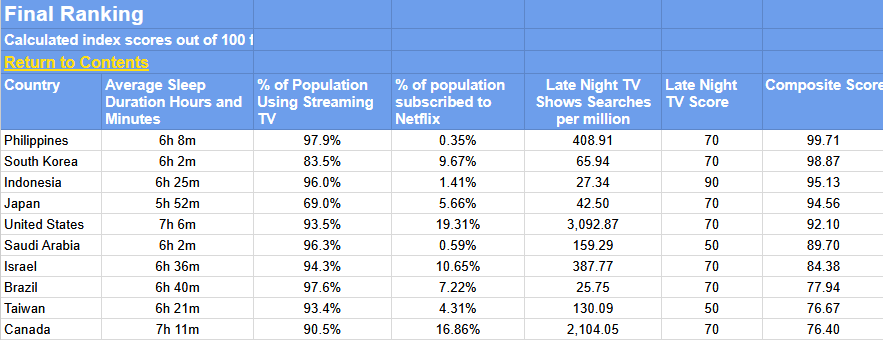Philippines Tops Global Rankings for TV-Induced Sleep Loss: A Growing Public Health Concern
The Philippines has officially claimed the top spot among nations where people lose the most sleep due to TV shows. A recent study by Onebed revealed that an overwhelming 97.9% of Filipinos use streaming TV services—the highest rate in the world—signaling a deep-rooted culture of late-night binge-watching.
With a Late Night TV score of 70 and 408.91 TV-related searches per million people, Filipinos are not just consuming digital entertainment at record rates—they are sacrificing precious sleep for it. The study ranked countries based on a composite score that factored in sleep duration, streaming service usage, and late-night TV engagement. The Philippines topped the list with an overall score of 99.71, reflecting a widespread shift in entertainment consumption habits.
![Person sleeping watching TV representation image [Photo by <a href="https://unsplash.com/@kalegin?utm_content=creditCopyText&utm_medium=referral&utm_source=unsplash">Михаил Калегин</a> on <a href="https://unsplash.com/photos/woman-sleeping-on-trailer-ffustAcaX0E?utm_content=creditCopyText&utm_medium=referral&utm_source=unsplash">Unsplash</a>]](http://ourdailynewsonline.com/wp-content/uploads/2025/02/kalegin-ffustAcaX0E-unsplash.jpg)
A Nation of Late-Night Viewers
Despite a relatively low Netflix subscription rate of 0.35%, the Philippines’ high streaming engagement suggests that Filipinos are turning to a variety of platforms beyond mainstream services. With prime time extending well past 10 PM, watching TV shows late into the night has become an ingrained habit.
The study also found that Filipinos sleep an average of only 6 hours and 8 minutes per night, significantly lower than the recommended 7-9 hours for adults. The combination of high streaming usage and late-night searches for TV content suggests a persistent trend of sleep deprivation caused by entertainment consumption.
The Health and Productivity Impact
While streaming services have revolutionized access to entertainment, the growing prevalence of TV-related sleep deprivation raises concerns about long-term public health effects. Chronic sleep deprivation is linked to a range of health issues, including weakened immune function, increased stress levels, and reduced cognitive performance.
Furthermore, sleep loss can impact workplace productivity, student performance, and overall well-being. With Filipinos dedicating significant late-night hours to binge-watching, experts warn that addressing these viewing habits is crucial to improving sleep health across the nation.
Can Filipinos Strike a Balance?
As streaming services continue to dominate the entertainment landscape, Filipinos may need to adopt healthier viewing habits, such as setting screen time limits, avoiding binge-watching before bed, and prioritizing consistent sleep schedules.
With digital content consumption at an all-time high, the challenge now is balancing entertainment with well-being—ensuring that the Philippines’ love for TV doesn’t come at the cost of its people’s health.
This study was conducted by Onebed, analyzing sleep loss due to TV habits across different countries.




